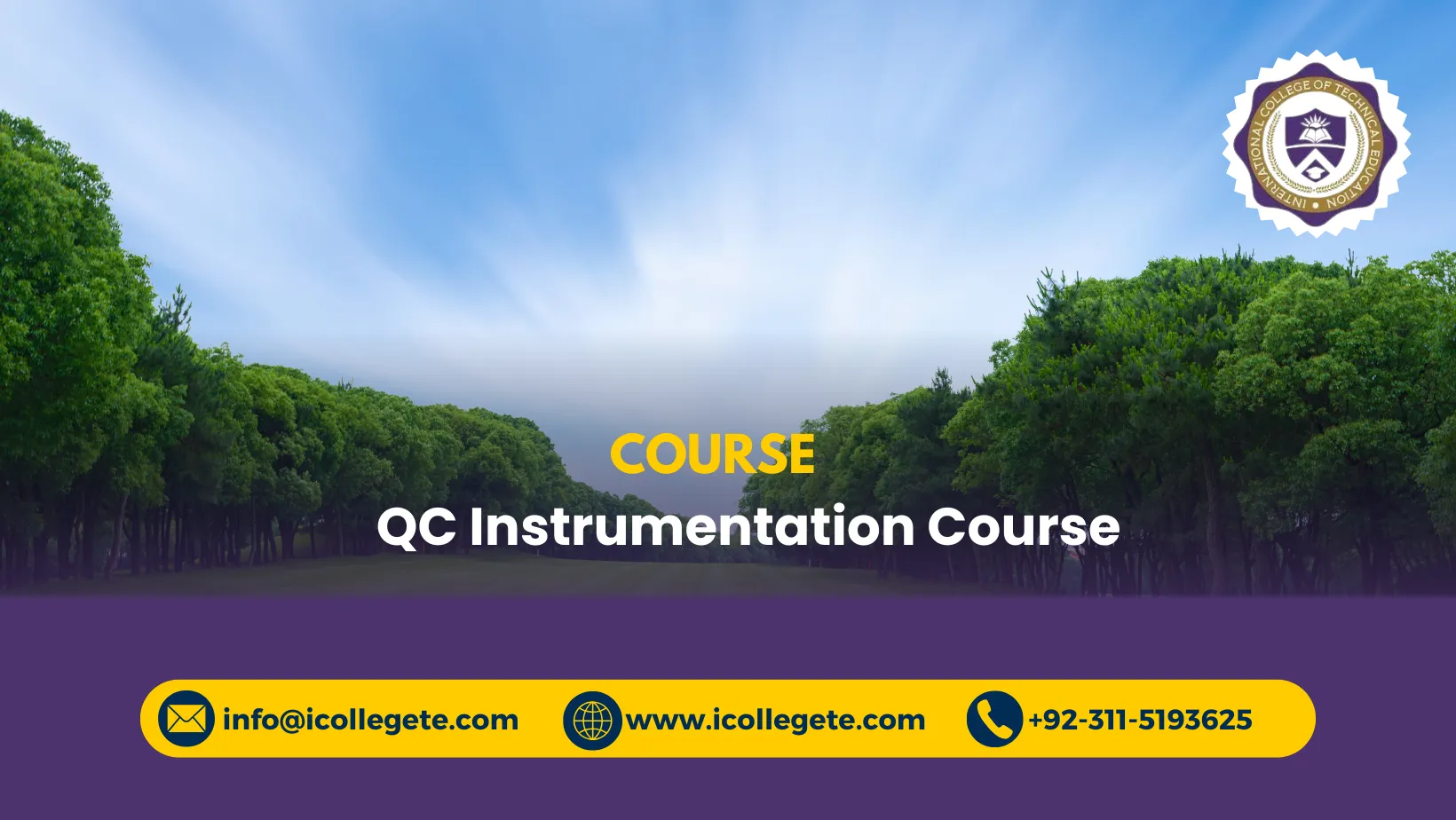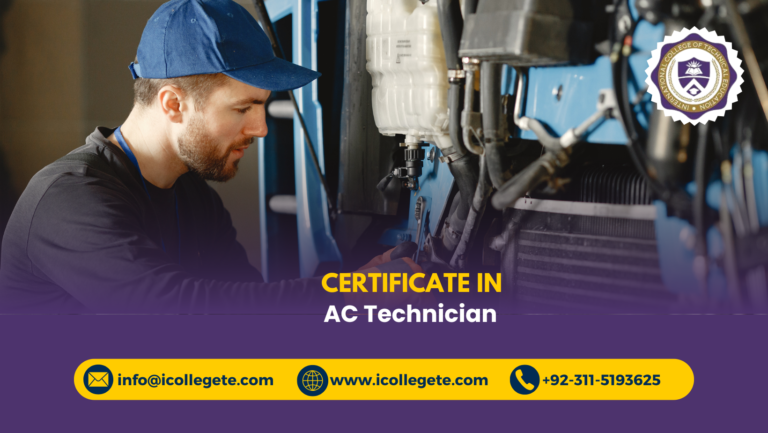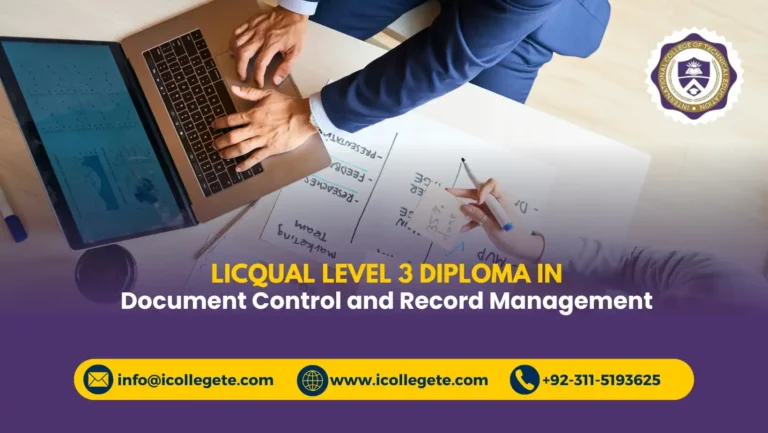Unlock precision and performance in industrial quality control with the QC Instrumentation Course in Rawalpindi—a specialized training program designed to equip learners with the technical skills required to operate, calibrate, and maintain instrumentation systems used in quality assurance across manufacturing, processing, and engineering environments. QC Instrumentation Course in Rawalpindi offers a structured pathway for individuals aiming to build careers in instrumentation and control, with a strong focus on accuracy, compliance, and operational efficiency.
Through a blend of theoretical instruction and hands-on practice, participants gain expertise in measuring instruments, process variables, calibration techniques, and data interpretation. The QC Instrumentation Course in Rawalpindi is tailored to meet industry standards, covering essential topics such as pressure, temperature, flow, and level measurement, along with instrumentation safety and documentation protocols. Learners are trained to work with modern tools and technologies used in industrial labs, production lines, and automated systems.
Ideal for technicians, engineers, and quality control professionals, the QC Instrumentation Course in Rawalpindi prepares students for roles in pharmaceuticals, oil and gas, food processing, and other precision-driven sectors. The QC Instrumentation Course in Rawalpindi emphasizes real-world applications, ensuring graduates are job-ready and capable of contributing to quality assurance and process optimization. With growing demand for skilled instrumentation personnel, this course provides a competitive edge in both local and international job markets. Enroll today to master the tools that drive quality, safety, and performance in modern industry.
Course Overview
The QC Instrumentation Course in Rawalpindi is a course-level technical training program built around six specialized study units that collectively prepare learners for precision-based roles in industrial quality control. Unlike general engineering programs, QC Instrumentation Course in Rawalpindi focuses specifically on instrumentation used to monitor, measure, and validate process variables in manufacturing and production environments. Each unit is designed to build practical competence in areas such as calibration, sensor technology, and signal processing, ensuring learners develop a targeted skill set aligned with industry needs.
Throughout the six-unit structure, participants engage with tools and techniques that support real-time quality assurance, including the operation of instruments for pressure, temperature, flow, and level measurement. The QC Instrumentation Course in Rawalpindi emphasizes accuracy, documentation, and compliance, enabling learners to contribute effectively to regulated sectors such as pharmaceuticals, food processing, and petrochemicals. The modular format allows for progressive learning, where each unit builds on the previous to reinforce technical depth and operational confidence.
QC Instrumentation Course in Rawalpindi is ideal for individuals seeking a focused, job-ready qualification that leads to employment in instrumentation and control. QC Instrumentation Course in Rawalpindi supports career development for technicians, quality control staff, and professionals transitioning into instrumentation roles. With a curriculum tailored to current industrial standards and practical applications, the QC Instrumentation Course in Rawalpindi offers a clear pathway to technical excellence and long-term career growth in quality-driven sectors.
Course Study Units
- Fundamentals of Instrumentation and Measurement
- Calibration Techniques and Standards
- Process Variables: Pressure, Temperature, Flow, Level
- Signal Conditioning and Data Acquisition
- Instrumentation Safety and Compliance Protocols
- Documentation and Quality Control Procedures
Learning Outcomes for this course
Understanding Instrumentation Principles
- Explain the role of instrumentation in industrial quality control
- Identify key components of measurement systems and their functions
- Distinguish between analog and digital instrumentation techniques
- Understand the relationship between process variables and control systems
- Interpret technical diagrams and instrumentation schematics
- Recognize the importance of precision and accuracy in measurement
- Apply basic instrumentation theory to real-world applications
Mastering Calibration Techniques
- Perform calibration procedures for pressure, temperature, flow, and level instruments
- Use calibration tools and standards according to industry protocols
- Record and interpret calibration data for quality assurance
- Identify calibration errors and apply corrective measures
- Maintain calibration logs and documentation for compliance
- Understand traceability and standardization in calibration practices
- Ensure instruments meet operational and regulatory requirements
Measuring Process Variables
- Monitor and measure pressure, temperature, flow, and level accurately
- Select appropriate instruments for specific process conditions
- Analyze readings and detect deviations from standard values
- Understand the impact of variable fluctuations on product quality
- Apply measurement techniques in controlled environments
- Troubleshoot measurement inconsistencies and sensor faults
- Integrate variable data into quality control systems
Applying Signal Conditioning and Data Acquisition
- Understand signal types and their characteristics in instrumentation
- Use amplifiers, filters, and converters for signal conditioning
- Set up data acquisition systems for continuous monitoring
- Interpret digital and analog signals for process control
- Ensure signal integrity and minimize interference
- Connect instrumentation outputs to control panels and software
- Analyze collected data for performance evaluation
Ensuring Safety and Compliance
- Identify safety hazards associated with instrumentation systems
- Follow standard operating procedures during installation and maintenance
- Use personal protective equipment (PPE) in lab and field settings
- Comply with national and international safety standards
- Document safety checks and incident reports accurately
- Conduct risk assessments for instrumentation tasks
- Promote a culture of safety in technical environments
Managing Documentation and Quality Control
- Prepare technical reports and instrument logs for audits
- Maintain records of calibration, maintenance, and inspections
- Use documentation to support regulatory compliance
- Track instrument performance over time for quality assurance
- Communicate findings to supervisors and quality teams
- Apply documentation standards used in industrial settings
- Support continuous improvement through accurate recordkeeping
Entry Requirements for this course
- Age Requirement Applicants must be at least 16 years old at the time of enrollment. This ensures maturity and readiness to engage with technical equipment and safety protocols.
- Educational Qualification Minimum qualification is matriculation (10th grade or equivalent). Candidates with science or technical subjects such as physics or mathematics will benefit more from the course content.
- Work Experience No prior work experience is required. However, individuals with basic exposure to industrial environments or technical workshops may find it easier to grasp instrumentation concepts.
- Language Proficiency A basic understanding of English or Urdu is recommended. Instructional materials, safety guidelines, and technical documentation may be presented in either language.
- Physical Fitness Applicants should be physically fit to handle instruments, perform calibration tasks, and work in lab or field conditions. Good hand-eye coordination and attention to detail are essential.
- Technical Interest A genuine interest in instrumentation, measurement systems, and quality control is expected. Curiosity and willingness to learn are key traits for success in this course.
- Commitment to Safety and Discipline Learners must be willing to follow strict safety protocols and operational procedures. Consistent attendance, punctuality, and adherence to lab rules are mandatory for certification.
- Basic Computer Literacy Familiarity with computers is helpful, especially for data logging, report writing, and using digital instrumentation software. This enhances learning and supports practical tasks.
Course Benefits of this course
Industry-Relevant Skill Development
- Gain hands-on expertise in operating industrial instrumentation systems
- Learn to measure and control key process variables with precision
- Understand calibration techniques used in regulated environments
- Build competence in signal conditioning and data acquisition
- Develop familiarity with modern instrumentation tools and software
- Strengthen your ability to interpret technical diagrams and schematics
- Improve troubleshooting skills for instrumentation faults
- Apply measurement principles in real-world production settings
- Align your skills with current industry standards and practices
Career Opportunities in Quality Control
- Qualify for technician roles in manufacturing, pharmaceuticals, and oil & gas
- Increase employability in quality assurance and process control departments
- Prepare for instrumentation roles in production and maintenance teams
- Enhance your profile for job applications in regulated industries
- Build a foundation for supervisory positions in technical environments
- Gain credibility for freelance and contract-based instrumentation work
- Support career transitions into specialized instrumentation fields
- Meet employer expectations for precision and compliance
- Access opportunities in both local and international markets
Practical Training and Application
- Participate in lab-based simulations and hands-on workshops
- Work with real instruments used in industrial settings
- Practice calibration and documentation procedures
- Apply safety protocols during instrumentation tasks
- Engage in scenario-based learning for process control
- Use diagnostic tools to identify and resolve faults
- Record and analyze data for performance evaluation
- Reinforce learning through practical assessments
- Build confidence in independent technical work
Compliance and Safety Awareness
- Learn to identify and mitigate instrumentation-related hazards
- Follow standard operating procedures for safe equipment handling
- Use personal protective equipment (PPE) effectively
- Understand regulatory requirements for instrumentation systems
- Maintain documentation for audits and inspections
- Promote safety culture in technical environments
- Conduct risk assessments for instrumentation tasks
- Ensure compliance with national and international standards
- Reduce workplace incidents through disciplined practices
Technical Confidence and Independence
- Interpret instrumentation data without supervision
- Make informed decisions during calibration and fault diagnosis
- Select appropriate tools and techniques for specific tasks
- Communicate technical findings clearly to supervisors
- Manage instrumentation tasks with minimal oversight
- Demonstrate initiative in solving process-related issues
- Build self-reliance in technical environments
- Support team operations with dependable performance
- Take ownership of quality control responsibilities
Pathway to Specialized Certifications
- Prepare for advanced certifications in instrumentation and control
- Build eligibility for government and private sector licensing
- Strengthen your portfolio for trade testing and evaluation
- Align your training with vocational qualification frameworks
- Support documentation required for formal registration
- Enhance your qualifications for regulated industry roles
- Improve readiness for certification exams
- Gain recognition for technical proficiency
- Validate your skills for long-term career growth
Business and Freelance Readiness
- Learn to offer instrumentation services independently
- Build client communication and service delivery skills
- Develop pricing strategies and service packages
- Manage small-scale projects and maintenance contracts
- Promote your services through professional branding
- Handle customer inquiries and technical support
- Maintain tools and inventory for field operations
- Deliver quality work that builds client trust
- Explore entrepreneurship in technical services
Adaptability to Emerging Technologies
- Understand trends in smart instrumentation and automation
- Learn basics of IoT-enabled measurement systems
- Explore integration of sensors with digital platforms
- Stay updated with evolving industry tools and standards
- Prepare for roles in data-driven quality control
- Support sustainable practices through efficient instrumentation
- Work with modern control systems and software
- Enhance your ability to adapt to new technologies
- Future-proof your career in instrumentation and quality assurance
Who Should Enroll in this course
- Matric and Intermediate Graduates Students who have completed their 10th or 12th grade and are looking to enter a technical field with strong industry demand.
- Aspiring Instrumentation Technicians Individuals aiming to build a career in industrial instrumentation, calibration, and process control systems.
- Quality Control Assistants Entry-level professionals in QA/QC departments who want to enhance their technical understanding of instrumentation tools and procedures.
- Production Line Operators Workers involved in manufacturing or processing who need to understand instrumentation for monitoring and maintaining product quality.
- Technical School Students Learners enrolled in vocational or technical institutes seeking specialization in instrumentation and measurement systems.
- Maintenance and Utility Staff Personnel responsible for maintaining industrial equipment who require knowledge of instrumentation for diagnostics and repairs.
- Pharmaceutical Industry Workers Employees in pharma production or QA roles who need to understand calibration and compliance for regulated environments.
- Oil and Gas Field Technicians Individuals working in energy sectors who want to strengthen their skills in pressure, flow, and temperature instrumentation.
- Food Processing Technicians Workers in food manufacturing who need to monitor process variables and ensure product consistency through instrumentation.
- Engineering Diploma Holders Students with diplomas in electrical, mechanical, or chemical engineering who wish to specialize in instrumentation.
- Industrial Electricians Electricians seeking to expand their expertise into instrumentation and control systems used in automated environments.
- Automation and Control Enthusiasts Learners interested in industrial automation who want foundational knowledge of sensors, transmitters, and data acquisition.
- Freelancers and Contractors Independent service providers looking to offer instrumentation-related services to industrial clients.
- Technicians Preparing for Trade Tests Candidates aiming to pass trade certification exams in instrumentation and quality control.
- NGO and Development Sector Workers Field staff involved in technical development projects requiring basic instrumentation knowledge for monitoring systems.
- Government Technical Staff Employees in public sector utilities or technical departments who need instrumentation training for operational roles.
- Overseas Job Seekers Individuals preparing for technical roles abroad where instrumentation skills are in high demand.
- Women Entering Technical Fields Female candidates interested in building careers in industrial technology and quality assurance.
- Career Changers from Non-Technical Fields Adults seeking to transition into a stable and skilled trade with practical training and job relevance.
- Entrepreneurs in Technical Services Business owners aiming to expand their service offerings to include instrumentation and calibration support.
Future Progression of this course
Advanced Diploma in Instrumentation and Control
- Deepen your understanding of industrial instrumentation systems and control mechanisms
- Learn advanced calibration techniques and documentation standards
- Explore automation technologies including PLCs and SCADA systems
- Study instrumentation integration in large-scale industrial processes
- Enhance your qualifications for supervisory and technical lead roles
- Gain exposure to international instrumentation standards and practices
- Prepare for roles in high-precision industries such as pharmaceuticals and petrochemicals
Certification in Industrial Automation
- Specialize in automation systems used in manufacturing and process control
- Learn to program and troubleshoot PLCs and HMI interfaces
- Understand sensor networks and control loop configurations
- Gain practical experience with automation hardware and software
- Improve your profile for roles in automated production environments
- Align your skills with Industry 4.0 technologies and trends
- Increase employability in smart manufacturing and robotics sectors
Instrumentation Technician Level II Training
- Advance your skills in multi-variable instrumentation systems
- Learn to manage complex installations and maintenance schedules
- Study advanced fault diagnostics and system optimization
- Work with digital instrumentation and remote monitoring tools
- Prepare for mid-level technician roles in industrial settings
- Improve your ability to lead small teams and manage technical tasks
- Build a foundation for future specialization in control engineering
Electrical and Instrumentation Integration Course
- Understand the relationship between electrical systems and instrumentation
- Learn to integrate control systems with electrical panels and circuits
- Gain skills in wiring, signal routing, and system configuration
- Enhance your ability to work on multidisciplinary technical projects
- Prepare for roles in utilities, energy, and infrastructure sectors
- Improve troubleshooting across electrical and instrumentation domains
- Support complex installations in industrial environments
Quality Assurance and Compliance Certification
- Learn advanced documentation and audit preparation techniques
- Understand regulatory frameworks for instrumentation in controlled industries
- Gain skills in internal quality audits and process validation
- Prepare for roles in QA/QC departments across manufacturing sectors
- Improve your ability to maintain compliance with ISO and GMP standards
- Support continuous improvement initiatives through instrumentation data
- Build credibility for roles in regulated environments
Calibration Specialist Training
- Specialize in high-accuracy calibration procedures and standards
- Learn to manage calibration labs and documentation systems
- Understand traceability and uncertainty in measurement
- Prepare for roles in metrology and precision engineering
- Gain expertise in national and international calibration protocols
- Support quality assurance through certified calibration practices
- Enhance your qualifications for technical consultancy roles
SCADA and Remote Monitoring Systems Course
- Learn to configure and operate SCADA systems for industrial control
- Understand data logging, remote access, and system alerts
- Gain skills in networked instrumentation and cloud-based monitoring
- Prepare for roles in utilities, water treatment, and energy sectors
- Improve your ability to manage distributed control systems
- Support real-time decision-making through instrumentation data
- Align your skills with modern infrastructure management technologies
Entrepreneurship in Instrumentation Services
- Learn how to start and manage your own instrumentation business
- Understand service pricing, client acquisition, and project management
- Build expertise in field calibration, installation, and maintenance
- Develop branding and marketing strategies for technical services
- Manage inventory, tools, and supplier relationships effectively
- Deliver high-quality services to industrial clients
- Explore opportunities in contract work and technical consultancy
Conclusion
The QC Instrumentation Course in Rawalpindi stands out not only for its technical depth but for its ability to shape professionals who understand the value of precision in every process. In today’s competitive industrial landscape, success depends on more than just operating instruments—QC Instrumentation Course in Rawalpindi requires a mindset geared toward consistency, accountability, and continuous improvement. QC Instrumentation Course in Rawalpindi fosters that mindset by encouraging learners to think critically about how data, systems, and standards interact to ensure product integrity and operational safety.
What makes QC Instrumentation Course in Rawalpindi truly impactful is its relevance across industries. Whether you’re working in a high-volume production facility or a specialized lab environment, the skills gained here are transferable, scalable, and immediately applicable. Learners are not just trained to follow procedures—they’re equipped to evaluate, adapt, and contribute to evolving quality frameworks.
Moreover, the QC Instrumentation Course in Rawalpindi cultivates a professional identity rooted in discipline and technical confidence. Graduates emerge with the ability to communicate findings, support audits, and uphold compliance—all while maintaining a sharp eye for detail. It’s a program designed for those who want to be more than just technicians; it’s for those who aim to be trusted contributors in quality-driven operations. For anyone seeking a future built on precision, reliability, and industry relevance, QC Instrumentation Course in Rawalpindi offers a solid and strategic starting point.





